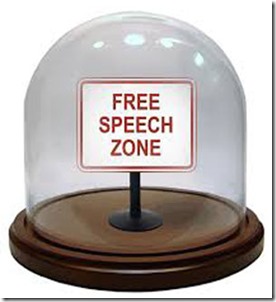By Marilyn Snyder
Stick and stones may break my bones but names will never hurt me. Not true, say those who take offense at every slight, gibe, criticism, or disagreement. They whine about what they call “hate” speech.
We have become a country obsessed by words. Every pundit, reporter, government official, and citizen is fanatically scrutinizing every word, verbal or printed. And every word seems to be problematic to some person or group.
Despite our Constitutional right, free speech is an endangered “species,” hounded to near-extinction by the “I’m offended” movement.
For example, if you oppose the policies of a black president, you are called a racist. That effectively ends the conversation. However, if you oppose the policies of a white president, you are, what? Normal? Impartial? The conversation can continue because the disagreement is political rather than racial.
If you are opposed to the Common Core education system imposed by the federal government, you are called ignorant. There’s a conversation stopper! You may have researched the topic thoroughly, but because your conclusions conflict with its promoters, you are reprimanded, denounced, and censured.

Once upon a time these words by Voltaire were on the front page of my town’s daily paper: “I disapprove of what you say but I will defend to the death your right to say it.” A very lofty objective which reflected the Constitution and Benjamin Franklin’s idea that “Whoever would overthrow the liberty of a nation must begin by subduing the freeness of speech.”
Yet despite the Constitution prohibiting the making of any law abridging the freedom of speech, “hate” speech laws abound.
Detractors say “I not only disapprove of what you say, but I will drive you from your job, destroy your reputation, attack you in every form of media, and badger you to death if you have the audacity to utter words which I find to be ‘hateful.’ “
According to USLegal.com, hate speech can be any form of expression regarded as offensive to racial, ethnic and religious groups and other discrete minorities or to women.
Now you know-the only group you can’t possibly offend by your speech is white males!
But can freedom of speech be half free? That is, you can say whatever you want but only as long it doesn’t offend someone? Anyone?
Ira Straus in the National Review said that the primary ground and origin of hate lies in the very subculture that criticizes “hate” most often, because it is uses “hate” as a label for smearing those it doesn’t like.
Indeed, the average citizen is probably not all that sensitive to what the various activists call politically incorrect talk. Those who whine about being offended are a minority of activists pursuing their own agenda and using “hate” speech as a tool. And they are the ones who make the headlines.
One of the best ways to shut down a debate is by acting angry and offended. For example, your saying that you oppose illegal immigration is offensive to some, so pro-illegal immigration activists call you “hateful” and the debate ends. To label the Michael Brown grand jury decision as correct is offensive to the “Hands up” activists, so no “national conversation” about race issues can take place.
Justice Oliver Wendell Holmes of the US Supreme Court said, “The principle of free thought is not free thought for those who agree with us but freedom for the thought we hate.”
Sadly, there is no “right” to live without being offended. Indeed, my right to offend, that is, to speak freely, is actually far more important than your right not to be offended. My right to free speech is upheld by the Constitution. What do you claim as your defense? That your feelings are hurt?
Despite our basic Constitutional guarantee that free speech is protected by the First Amendment, a variety of “anti-everything” groups make it impossible for citizens, government officials, pundits and leaders to speak freely for fear of retaliation. Freedom of speech cannot co-exist with the thunderous onslaught of the “I’m offended” group. The occupants of “the land of the brave” have to reject that fear and work for universal freedom.
We can start by standing alongside conservatives and tea party members who support the Constitutional right to free speech. We must repudiate the invidious logic of “your right to free speech ends where my right not to be offended begins.” Indeed we must champion a euphonious culture of free speech.
Otherwise the day may come when your grandchild sits at your knee looking up at you with complete trust in you, and asks: “What was it like to have freedom of speech?”
Marilyn Snyder has a Master’s Degree in Systems Analysis from USC. She is a member of the Redlands Tea Party Patriots. Contact her at PatriotMarilyn@gmail.com.

